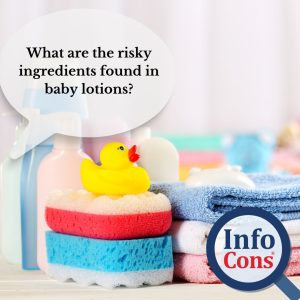Baby lotions are essential for moisturizing and protecting the delicate skin of infants. However, not all products on the market are created equal. Some lotions contain ingredients that can be harmful to babies’ sensitive skin. In this article, we will explore the risky ingredients that can be found in baby lotions and why they should be avoided.
1. Parabens
Parabens are widely used preservatives in cosmetics to prevent the growth of bacteria and mold. While effective, they can cause allergic reactions and skin irritations. Studies suggest that parabens may have endocrine-disrupting effects, interfering with hormonal functions and affecting the healthy development of children.
2. Phthalates
Phthalates are used to stabilize fragrance in cosmetic products. Exposure to phthalates has been linked to developmental and endocrine system issues. They can cause skin irritations and allergic reactions, posing significant risks to the sensitive skin of babies.
3. Artificial Fragrances
Synthetic fragrances are added to many lotions to give them a pleasant smell. However, they can contain various chemicals that may cause allergies, skin irritations, and respiratory reactions. Additionally, many artificial fragrances contain chemicals with potential carcinogenic properties.
4. Formaldehyde and Formaldehyde Releasers
Formaldehyde is a powerful preservative but is known for its carcinogenic properties. Some baby lotions may contain formaldehyde releasers, substances that decompose over time to release formaldehyde. This can cause skin, eye, and respiratory irritations.
5. Sodium Lauryl Sulfate (SLS) and Sodium Laureth Sulfate (SLES)
SLS and SLES are cleansing agents that create foam in cosmetic products. They can be too harsh for the delicate skin of babies, causing dryness, irritations, and allergies. Furthermore, SLES may be contaminated with 1,4-dioxane, a possible carcinogen.
6. Denatured Alcohol
Denatured alcohol is often used as a solvent in lotions. It can dry out the skin and cause irritations, particularly problematic for babies’ sensitive skin. Frequent exposure to denatured alcohol can lead to imbalances in the skin’s protective barrier.
7. Mineral Oils
Mineral oils, derived from petroleum, are used for their moisturizing properties. While they create a protective barrier on the skin, they can block pores and prevent the skin from breathing, leading to irritations and rashes.
How to Choose a Safe Baby Lotion?
To choose a safe lotion for your baby, it is important to read product labels and avoid the risky ingredients mentioned above. Here are some helpful tips:
Opt for Fragrance-Free or Naturally Scented Products: Products without fragrance or those using natural essential oils are preferable.
Look for Safety Certifications: Products with certifications from recognized organizations (such as Ecocert or USDA Organic) offer an additional guarantee of ingredient safety.
Choose Hypoallergenic Products: These products are specifically formulated to minimize the risk of allergic reactions and irritations.
Consult a Dermatologist: If in doubt, consult a dermatologist for specific recommendations for your baby’s skin.
Babies’ skin is extremely sensitive and vulnerable to harsh chemical ingredients. Choosing a safe and natural lotion can prevent irritations and other skin issues, ensuring optimal protection for your baby. Pay attention to product labels and educate yourself about the ingredients you apply to your child’s delicate skin.
Types of Baby Lotions to Avoid
Choosing a safe and effective baby lotion is essential for protecting their delicate skin. However, not all lotions on the market are suitable for babies’ sensitive skin. Here are some types of lotions you should avoid:
Lotions with Parabens: Parabens are preservatives used to extend the shelf life of cosmetic products. They can cause allergic reactions and are suspected of disrupting the hormonal system. Avoid lotions that contain ingredients like methylparaben, ethylparaben, propylparaben, and butylparaben.
Lotions with Phthalates: Phthalates are added to stabilize fragrance in cosmetic products. They are known for their endocrine-disrupting effects and can cause skin irritations. Avoid lotions containing diethyl phthalate (DEP) or other phthalates.
Lotions with Artificial Fragrances: Synthetic fragrances can contain hundreds of chemicals, many of which are irritating to sensitive baby skin. They can cause allergies and skin irritations. Choose fragrance-free lotions or those with natural fragrances, such as essential oils.
Lotions with Formaldehyde or Formaldehyde Releasers: Formaldehyde is an effective preservative but is known for its carcinogenic properties. Formaldehyde releasers, such as quaternium-15, DMDM hydantoin, and imidazolidinyl urea, should also be avoided as they release formaldehyde over time.
Lotions with Sodium Lauryl Sulfate (SLS) and Sodium Laureth Sulfate (SLES): These substances are cleansing agents that can be too harsh for babies’ sensitive skin, causing dryness and irritations. Additionally, SLES can be contaminated with 1,4-dioxane, a possible carcinogen.
Lotions with Denatured Alcohol: Denatured alcohol is used as a solvent in many cosmetic products but can dry out and irritate babies’ delicate skin. Avoid lotions that list denatured alcohol on the ingredient list.
Lotions with Mineral Oils: Mineral oils, derived from petroleum, create a protective barrier on the skin but can block pores and prevent the skin from breathing, leading to irritations and rashes.
Lotions with Artificial Colorants: Artificial colorants added to lotions provide no benefit to the skin and can cause irritations and allergic reactions. Choose lotions without artificial colorants to minimize the risk of irritation.
Tips for Choosing a Safe Lotion
To ensure you choose a safe lotion for your baby, follow these tips:
Read Labels: Check the ingredient list to avoid harmful chemicals.
Look for Natural Products: Choose lotions with natural and organic ingredients, such as aloe vera, shea butter, coconut oil, and plant extracts.
Prefer Hypoallergenic Products: These are formulated to minimize the risk of allergies and irritations.
Consult a Specialist: If in doubt, consult a pediatrician or dermatologist for recommendations.
Test the Product: Before applying a new lotion all over your baby’s body, test it on a small area of skin to check for adverse reactions.
Avoiding lotions with risky ingredients is crucial for protecting babies’ delicate skin. Opt for natural, fragrance-free, and artificial colorant-free products, and always read labels to ensure you choose the safest products for your child. This way, you will provide optimal skin care for your baby, preventing irritations and other dermatological problems.
Source: Consumer Reports
